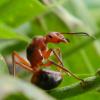- Formiculture.com
- Forums
- Gallery
- Members
- Member Map
- Chat

All my inverts
Started By
ponerinecat
, Dec 9 2019 5:13 PM
343 replies to this topic
#21
 Offline
-
Posted December 14 2019 - 7:43 PM
Offline
-
Posted December 14 2019 - 7:43 PM
There you go!
"The ants are a people not strong, yet they prepare their meat in the summer." Prov. 30:25
Keep ordinary ants in extraordinary ways.
Keep ordinary ants in extraordinary ways.
#22
 Offline
-
Posted December 15 2019 - 4:14 AM
Offline
-
Posted December 15 2019 - 4:14 AM
i am on a quest to find out as much as possible about
mites
do you know anything about keeping them and any tips?
#23
 Offline
-
Posted December 15 2019 - 11:32 AM
Offline
-
Posted December 15 2019 - 11:32 AM
#24
 Offline
-
Posted December 15 2019 - 12:13 PM
Offline
-
Posted December 15 2019 - 12:13 PM
P0rcelain, on 15 Dec 2019 - 12:14 PM, said:
i am on a quest to find out as much as possible about
mitesdo you know anything about keeping them and any tips?
Mites are extremely diverse. I plan on collecting some soon. I cannot really generalize any information, so please specify what mites you wish to keep.
#25
 Offline
-
Posted December 15 2019 - 12:25 PM
Offline
-
Posted December 15 2019 - 12:25 PM
Porcellio scaber
Motyxia sp.
Another cyanide producing millipede, these ones make up for their dull color in being bioluminescent.
Pedetontus sp.
These are basically giant springtails with scales. They are interesting as they follow predictable chemical trails when foraging.
- TennesseeAnts, ANTdrew, Antennal_Scrobe and 3 others like this
#26
 Offline
-
Posted December 15 2019 - 1:04 PM
Offline
-
Posted December 15 2019 - 1:04 PM
The motyxia ia likely M. monica
#27
 Offline
-
Posted December 16 2019 - 12:12 AM
Offline
-
Posted December 16 2019 - 12:12 AM
ponerinecat, on 15 Dec 2019 - 8:13 PM, said:
P0rcelain, on 15 Dec 2019 - 12:14 PM, said:
i am on a quest to find out as much as possible about
mitesdo you know anything about keeping them and any tips?
Mites are extremely diverse. I plan on collecting some soon. I cannot really generalize any information, so please specify what mites you wish to keep.
ok, yes, sorry. i knew this so idk what i was doing.
i am mainly interested in predatory mites and parasitic mites.
i have been doing a lot of research to find out as much as i can about the problems people have been having with parasitic mites so i can figure out effective long term solutions.
best bet to me seems to be predatory mites, as mites (in general) usually are pretty hard to get rid of and their eggs can survive almost anything (almost).
so my basic line of thinking is essentially fight fire with fire.
from my research so far i estimate that mites which practice phoretic behaviour on earth dwelling insects seem to have the highest chance of working well for preventing parasitic mites in ants.
or at least reducing them to levels in which something that would cause an unfortunate period of weakness in most wild ant colonies no longer completely exterminates 'domestic' ant colonies.
i am aware of the unlikelihood that you have anything to say about parasitic mites since the odds of someone raising mites that are parasitic is pretty slim for a number of reasons.
but hopefully you could tell me about keeping predatory mites? or at least, give insight into any species which you think are worth me investigating.
Edited by P0rcelain, December 16 2019 - 12:17 AM.
#28
 Offline
-
Posted December 16 2019 - 12:34 AM
Offline
-
Posted December 16 2019 - 12:34 AM
Love your globular springtails
#29
 Offline
-
Posted December 16 2019 - 1:13 PM
Offline
-
Posted December 16 2019 - 1:13 PM
A glowing, toxic millipede.... Hmmm. Did you leave your nuclear waste in the yard again?
- ANTdrew and DDD101DDD like this
My Main Journal | My Neivamyrmex Journal | My Ant Adoption | My YouTube
Join the TennesseeAnts Discord Server! https://discord.gg/JbKwPgs
#30
 Offline
-
Posted December 16 2019 - 5:02 PM
Offline
-
Posted December 16 2019 - 5:02 PM
P0rcelain, on 16 Dec 2019 - 08:12 AM, said:
ponerinecat, on 15 Dec 2019 - 8:13 PM, said:
P0rcelain, on 15 Dec 2019 - 12:14 PM, said:
i am on a quest to find out as much as possible about
mitesdo you know anything about keeping them and any tips?
Mites are extremely diverse. I plan on collecting some soon. I cannot really generalize any information, so please specify what mites you wish to keep.
ok, yes, sorry. i knew this so idk what i was doing.
i am mainly interested in predatory mites and parasitic mites.
i have been doing a lot of research to find out as much as i can about the problems people have been having with parasitic mites so i can figure out effective long term solutions.
best bet to me seems to be predatory mites, as mites (in general) usually are pretty hard to get rid of and their eggs can survive almost anything (almost).
so my basic line of thinking is essentially fight fire with fire.
from my research so far i estimate that mites which practice phoretic behaviour on earth dwelling insects seem to have the highest chance of working well for preventing parasitic mites in ants.
or at least reducing them to levels in which something that would cause an unfortunate period of weakness in most wild ant colonies no longer completely exterminates 'domestic' ant colonies.
i am aware of the unlikelihood that you have anything to say about parasitic mites since the odds of someone raising mites that are parasitic is pretty slim for a number of reasons.
but hopefully you could tell me about keeping predatory mites? or at least, give insight into any species which you think are worth me investigating.
I don't do much in terms of predatory mites. I have seen a few worth keeping, especially a very nice red one with white hairs, but I don't know much about them being used on ants. Probably your best bet is any type of mite that feeds on smaller ones. I don't know much about them though.
#31
 Offline
-
Posted December 17 2019 - 5:41 PM
Offline
-
Posted December 17 2019 - 5:41 PM
#32
 Offline
-
Posted December 17 2019 - 5:52 PM
Offline
-
Posted December 17 2019 - 5:52 PM
ill be getting some more exotic isopods around christmas, including orange porcellio laevis or scaber and dalmation isopods, as well as some dwarf whites.
- Antennal_Scrobe likes this
#33
 Offline
-
Posted December 17 2019 - 7:50 PM
Offline
-
Posted December 17 2019 - 7:50 PM
ok, thanks anyway.
Edited by P0rcelain, December 17 2019 - 7:50 PM.
#34
 Offline
-
Posted December 18 2019 - 4:15 PM
Offline
-
Posted December 18 2019 - 4:15 PM
#35
 Offline
-
Posted December 19 2019 - 4:54 PM
Offline
-
Posted December 19 2019 - 4:54 PM
#36
 Offline
-
Posted December 20 2019 - 2:59 PM
Offline
-
Posted December 20 2019 - 2:59 PM
#37
 Offline
-
Posted December 20 2019 - 4:28 PM
Offline
-
Posted December 20 2019 - 4:28 PM
#38
 Offline
-
Posted December 21 2019 - 4:14 PM
Offline
-
Posted December 21 2019 - 4:14 PM
#39
 Offline
-
Posted December 23 2019 - 5:48 PM
Offline
-
Posted December 23 2019 - 5:48 PM
Nice. I checked my springtail set up (just a ghetto salad greens box full of dirt), and they’re looking good. I have them out on my patio, so I’m impressed by their cold tolerance. We got down to 22F the other night.
I need to keep them in the cold because my primary reason for the box is to cold stratify wildflower seeds.
I need to keep them in the cold because my primary reason for the box is to cold stratify wildflower seeds.
"The ants are a people not strong, yet they prepare their meat in the summer." Prov. 30:25
Keep ordinary ants in extraordinary ways.
Keep ordinary ants in extraordinary ways.
#40
 Offline
-
Posted December 23 2019 - 8:12 PM
Offline
-
Posted December 23 2019 - 8:12 PM
ANTdrew, on 24 Dec 2019 - 01:48 AM, said:
Nice. I checked my springtail set up (just a ghetto salad greens box full of dirt), and they’re looking good. I have them out on my patio, so I’m impressed by their cold tolerance. We got down to 22F the other night.
I need to keep them in the cold because my primary reason for the box is to cold stratify wildflower seeds.
Over here, springtails only come out in the cold. They're called snow fleas for a reason.
- ANTdrew likes this
1 user(s) are reading this topic
0 members, 1 guests, 0 anonymous users








































